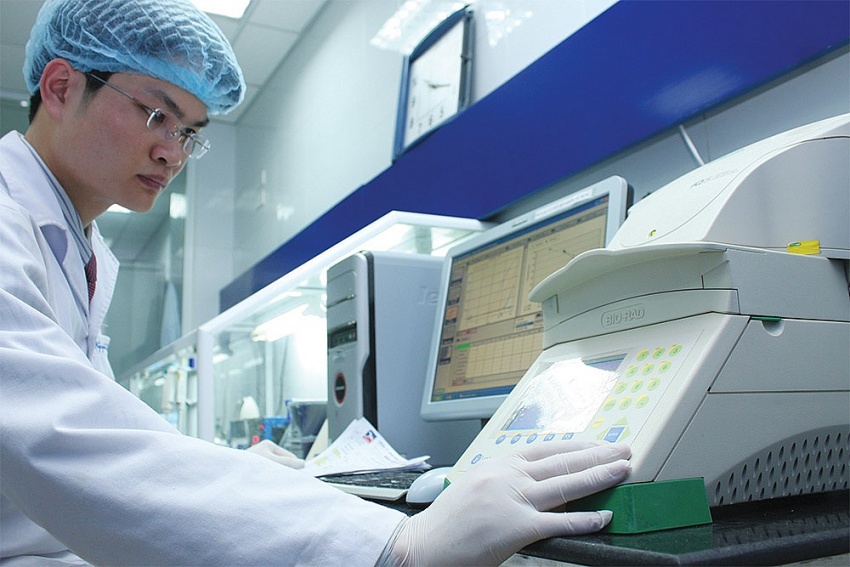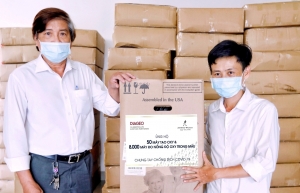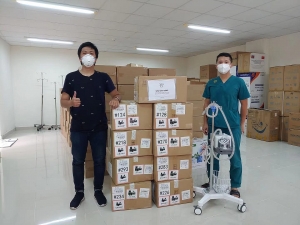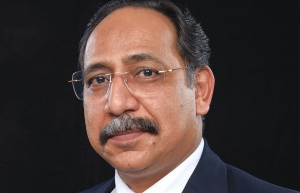Expectations rise for medical devices
 |
| Clearer guidelines for medical device tendering are being called for, photo Le Toan |
Decree No.96/2023/ND-CP taking effect from January 2024 is bringing fresh air to the business community and eases some concerns over marketing authorisations (MAs) for medical devices by having regulations on prioritising processing of medical device registration applications for some certain cases.
They include domestically made devices, imported ones having submitted an application for a medical equipment import licence to the Ministry of Health (MoH) before January 2022 but having not yet been granted an import licence and having submitted an application for MA, and those to implement new methods applied in medical treatment that are approved in writing by the MoH, but have not been granted MAs in Vietnam, among others.
Decree 96 solves a problem related to a lack of regulations on prioritising processing for advanced medical equipment, systems and technologies in previous decrees, which caused a backlog for Class C and D medical device dossiers.
Nguyen Tu Hieu, deputy director of the MoH’s Infrastructure and Medical Device Administration (IMDA) said that over past months, the ministry has taken actions to quicken granting MAs to medical devices, including Decree No.07/2023/ND-CP amending and supplementing a number of articles regarding the management of medical equipment.
“In addition, to ensure supply and access to medical equipment, especially new equipment and new technology, the ministry continues to advise the government to issue Decree 96 supplementing the regulations on prioritised cases for granting MAs to increase the access as quickly as possible,” he added.
According to the MoH’s statistics, the number of MA numbers issued at the end of 2023 increased six times compared to early 2023.
In late 2023, the IMDA and the Medical Devices and Diagnostics Sector Committee (MDDSC) of the European Chamber of Commerce in Vietnam (EuroCham) signed an MoU on enhancing the regulatory climate and healthcare access towards promoting technological advancements in the medical device sector.
“This MoU is a significant landmark, promoting cooperation and knowledge sharing with leading European medical device manufacturers but also international regulators. Our goal is to strengthen this collaboration and to transfer knowledge towards Vietnam’s medical device sector, focusing on the welfare of Vietnamese patients,” said Fabian Singer, vice chairman of the MDDSC.
This collaboration aims to enhance regulatory and legal efficiency, emphasising key areas like expedited criteria for critical product registrations and authorisations, price negotiation, and central procurement for selected supplies, among other topics.
Nevertheless, recent improvements have not fully met expectations among multinational corporations of the MDDSC. According to EuroCham, Decree 07 has prolonged the import licence and marketing authorisation’s expiration date to the end of 2024. This extension allows the MoH more leeway to evaluate and issue marketing authorisation numbers for Class C and D medical devices. However, the rate of approval for these devices remains noticeably low.
The chamber warned that several factors contribute to the delay, such as recent upheavals in the sector, including manpower shortage, inadequate legal frameworks, and challenges in adapting to the swiftly changing medical trends. This situation sparks concerns over possible supply chain interruptions if these devices are not approved by 2025.
At EuroCham’s WhiteBook Launch 2024 held in January, Singer requested the MoH’s support in accelerating product registration processes. “This is particularly vital for Class C and D medical devices, where we advocate for quicker evaluation and authorisation to ensure their consistent availability for the Vietnamese people and to facilitate access to modern and innovative technologies sooner,” he said. “Moreover, we propose a mechanism for fast-track marketing authorisations for products with valid import licences or previous marketing authorisations that currently require a new submission due to changes, to prevent supply shortages in the hospitals.”
He elaborated that another key focus is the tendering process for devices. “We suggest clear guidelines for tendering procedures, especially the cost-per-test model, and advocate for adjustments in tendering that prioritise quality over just technical specifications and price. This approach better reflects clinical benefits,” Singer said.
Additionally, to alleviate the financial burden of costly treatments and promote healthier habits, the MDDSC recommends supplementary health insurance and health insurance funds and budgets to facilitate early detection and screening, prevention and primary health. This shift addresses the evolving health needs of a developing and ageing population, facing diseases such as lung cancer, breast cancer or cardiovascular disease.
“We urge the MoH to update regulations, ensuring access to modern medical devices and new clinical services for Vietnamese patients. We finally propose regular updates to the list of Medical Technical Services and collaboration with Departments under the MoH and Vietnam Social Security for cost calculation of these services,” Singer proposed.
 | Diageo donates medical devices to support COVID-19 fight in Vietnam Diageo Vietnam Ltd., belonging to Diageo Plc, a global leader in alcoholic beverages, has just delivered 30 oxygen concentrator units to representatives of the Central Committee of the Vietnam Fatherland Front at various districts in Ho Chi Minh City. |
 | SPG Invest donates medical devices to 10 frontline hospitals in Ho Chi Minh City Australia-based SPG Invest and its member companies have donated 100 units of High-Flow Nasal Cannula Oxygen Therapy Devices (HFNC) to 10 frontline hospitals and field hospitals in Ho Chi Minh City. |
 | Backlog remains in new decree on medical devices We highly applaud the Vietnamese government for its continuous efforts in the process of building and perfecting the legal framework and the strong and positive support to the European business community in Vietnam this year. |
What the stars mean:
★ Poor ★ ★ Promising ★★★ Good ★★★★ Very good ★★★★★ Exceptional
Related Contents
Latest News
More News
- Masan Consumer names new deputy CEO to drive foods and beverages growth (February 23, 2026 | 20:52)
- Myriad risks ahead, but ones Vietnam can confront (February 20, 2026 | 15:02)
- Vietnam making the leap into AI and semiconductors (February 20, 2026 | 09:37)
- Funding must be activated for semiconductor success (February 20, 2026 | 09:20)
- Resilience as new benchmark for smarter infrastructure (February 19, 2026 | 20:35)
- A golden time to shine within ASEAN (February 19, 2026 | 20:22)
- Vietnam’s pivotal year for advancing sustainability (February 19, 2026 | 08:44)
- Strengthening the core role of industry and trade (February 19, 2026 | 08:35)
- Future orientations for healthcare improvements (February 19, 2026 | 08:29)
- Infrastructure orientations suitable for a new chapter (February 19, 2026 | 08:15)

 Tag:
Tag:


















 Mobile Version
Mobile Version